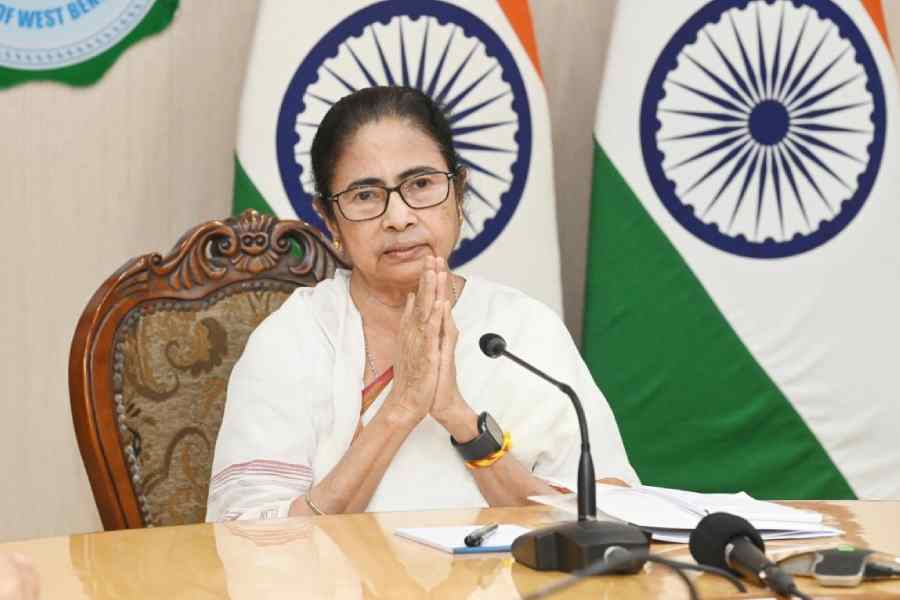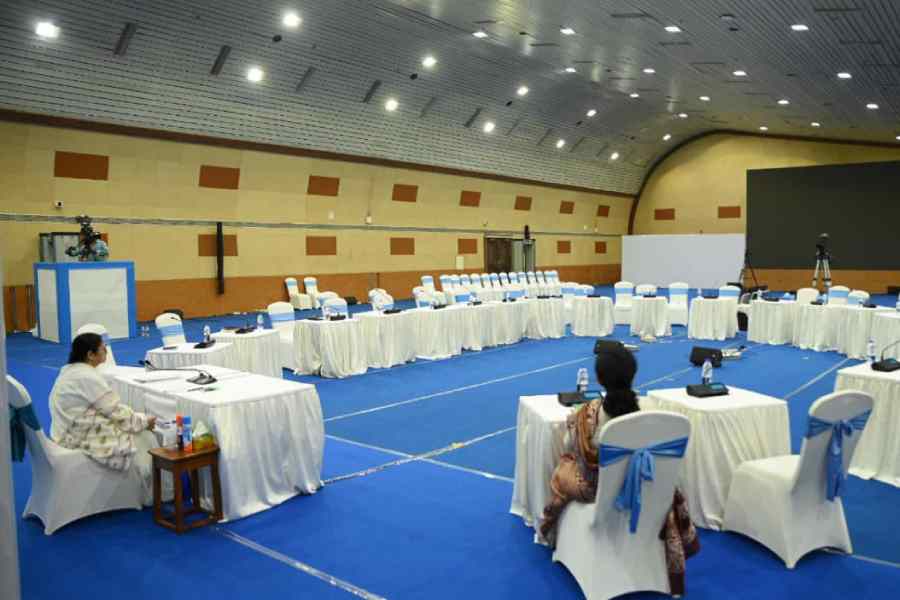Beseiged Bengal saw a different Mamata Banerjee on Thursday. One with folded hands.
The firebrand chief minister displayed a rare mellowness and restraint as she repeatedly entreated the junior doctors to end their cease-work for the sake of their distressed patients, and apologised to the public for her failure to find a solution so far.
But, the seasoned politician she is, Mamata also tried to push the agitating medicos on the back foot, subtly emphasising how she had walked the extra mile to facilitate a dialogue and obliquely suggesting the protest had behind-the-scenes political backing.
“Please return to work,” she said, palms juxtaposed in appeal, during a televised address to the medicos, who have been protesting since the August 9 rape and murder of a postgraduate trainee at RG Kar Medical College and Hospital.
“We also want justice for Tilottoma,” she said, underscoring that she was on the same page with the protesters.
The junior doctors’ cease-work has hobbled the public health delivery system in Bengal for the last 35 days — Mamata claimed it had caused 27 deaths and denied treatment to more than 7 lakh patients.
The first hopes of a breakthrough had emerged on Tuesday, when the government and the junior doctors opened a channel of communication by exchanging emails that explored the possibility of a dialogue.

Her hands folded, Mamata addresses the media conference at Nabanna Sourced by The Telegraph
After three rounds of emails over two days — during which both sides conceded ground to pave the way for a dialogue — a busload of junior doctors arrived at Nabanna around 5.20pm on Thursday.
But the hopes of a solution were dashed even before the two sides could reach the talks table: the medicos refused to engage in a dialogue unless the government agreed to live-stream the discussions from inside the Nabanna Sabhaghar.
After spending more than two hours at the meeting venue, rows of empty chairs arrayed in front of her, a sombre Mamata appeared before the cameras to address the protesters and the public.
“I tried my best to sit with the junior doctors.... I spent three days for them — waiting, waiting, waiting. I waited for three days with my highest officials. I am sorry. I apologise to the people of the country and the entire world,” she said, admitting her failure to find a solution to the stalemate.
Mamata said the junior doctors could have raised any question they wanted at the scheduled meeting.
“I am even willing to resign for the sake of the people.... I don’t need the chief minister’s chair. I want justice for Tilottoma,” she said.
Mamata took care to explain that while arrangements had been made to “record” (film) the proceedings — which the government was willing to share with the doctors’ delegation as a transparency measure — live-streaming the discussions was not possible because of “procedural issues”.
“We have to follow the process as the matter is being heard by the Supreme Court. The matter is (being) investigated by the CBI and there are issues pertaining to the investigation,” she said.
The chief minister appealed to the protesting doctors’ conscience. “Waiting patiently for a resolution is like a test.... Please care for the patients and I urge you to return to work,” she said.
“We had expected an open discussion.... We told them to bring a 15-member delegation, but 34 of them came for the meeting. We allowed all of them, but they didn’t even enter the meeting room.”
Trying to convey that the government had bent backwards to accommodate the junior doctors, Mamata underlined that she had not invited any health department officials — the protesting doctors are up in arms against some of them — to the meeting.
“I did not bring my phone to the meeting room as no one was allowed to come with their phone,” she added.
While her appeal for an end to the cease-work had not yielded results till late in the night, she seemed to have succeeded in wrong-footing the protesters who, through the evening, kept trying to justify their demand for live-streaming.
Multiple sources in the state government and the medical fraternity said the possibility of a resolution looked brighter now with the junior doctors likely to come under pressure following the chief minister’s appeal.
Mamata promised not to take any punitive action against the protesting junior doctors — unlike Uttar Pradesh, she said without much elaboration — won her plaudits from several doctors, who did not wish to be named.
“This stance of the government will make it difficult for the juniors to continue with the agitation as ordinary people may not like such hardening of their position,” a senior doctor, who had participated in some of the protest marches, said.
Mamata’s speech made it clear that she was also addressing the public in general, who had come out in large numbers in urban and semi-urban areas in support of the protesting doctors.
“The people of Bengal do have sympathy for Tilottoma.... We all agree with her family that the CBI should complete the investigation,” is how she began her address, adopting a placatory tone.
In the second half of her speech, however, she tossed up several questions for the public at large to ponder over.
“The ordinary people supported the movement seeking justice for Tilottoma.... But there was a demand for chair (a change of guard),” Mamata said.
She questioned the rationale behind the personal attacks on her during the protest and the barrage of “misinformation and disinformation” on social media.
She also raised a key question — whether some of the junior doctors were “taking instructions from outside”.
“I know that some of them wanted to engage, to enter the meeting room for a dialogue.... But there were two-three among them who were receiving instructions from outside,” Mamata said, questioning by implication the protesters’ claim of being “apolitical”.
An observer who has followed Mamata’s political career said the 25-minute address was one of her best.
“It was a very sensitive appeal and she came across as someone saying what she believed in.... Besides, she also tactically touched on the issue of morality — how doctors need to repay society and the State, which have a role in grooming them,” the observer said.











